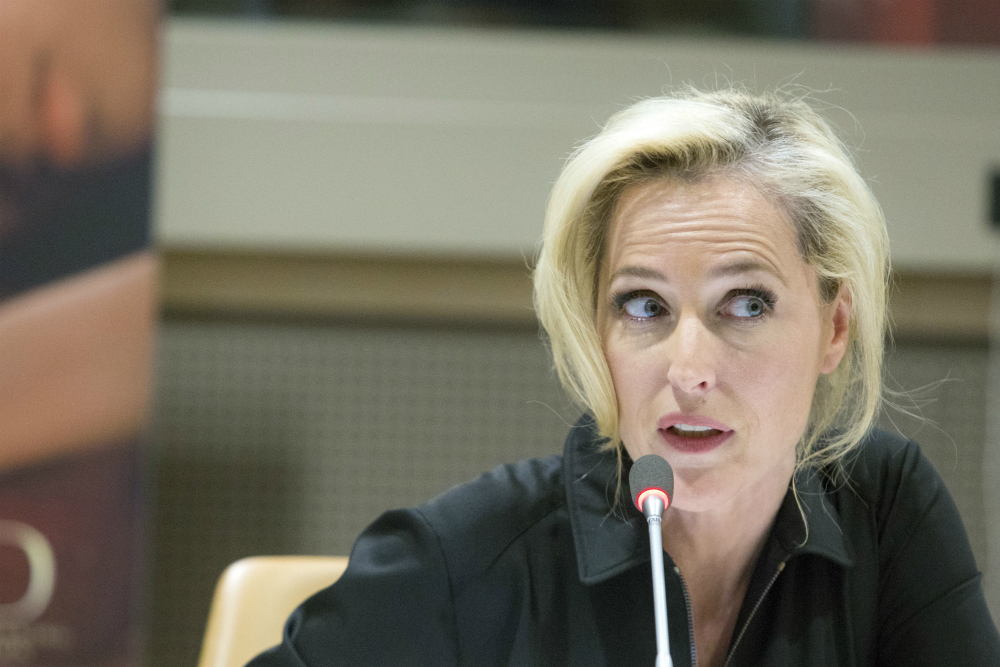Gillian Anderson stars with David Arquette in the movie Sold, opening in April. The film, produced by Emma Thompson, is an adaptation of Patricia McCormick’s book about Lakshmi, a Nepalese girl who is traded to a brothel in Kolkata (formerly Calcutta). The story was derived from many true stories about the horrors of child trafficking. Here’s the trailer. Gillian spoke to Today about the film and her part, based on humanitarian photographer Lisa Kristine. I transcribed most of the interview below but you can also watch the video.
On why families give up their children unknowingly to traffickers
Sometimes they can be coerced to sending their child away in order to make money, but what they don’t realize is they have just sold the child or even just given away the child to a trafficker who has then sold them into another city. They never see the child again. The child ends up going into the sex trade and doesn’t get paid themselves, is beaten, threatened and is treated like a prisoner.On her character
She’s based on a humanitarian photographer called Lisa Kristine, who has worked many years documenting human slavery. This is based on her work and she ends up leading some of the local law enforcement to do a raid on this brothel and save this girl and many other girls who are imprisoned there. The light of this child and her determination makes you so moved by the subject matter and her story, which is the story of hundreds of thousands of children around the world.The bleak economics and statistics of human trafficking
The fact of human trafficking is actually that it’s a $150 billion global industry. One of the fastest growing black market industries is the sale of children for the sex trade. They estimate that there are between 20 and 30 million slaves in the world today… including in our own cities that we live in, Washington DC, New York.About the Taught Not Trafficked campaign
It’s a campaign to raise money and awareness to get children into schools because it’s determined that if children are educated up to the age of 16 they have an 80% less chance of being trafficked. So Taught Not Trafficked is so… they can have an education, so they can have a bigger life.On how this is a US problem as well
There are stories every single day of girls on the missing list who are in New Jersey and New York and Washington DC who go missing and what they find out, many years later, is that they were actually trafficked into sex slavery
Gillian spoke on this subject to the UN on Wednesday at The Role of the Arts in Helping to End Human Trafficking panel. Here is video of Arquette also on Today talking about the film. It’s a bit of a jarring transition when they go from speaking about Sold to Pee Wee ‘sBig Holiday. Both Gillian and Arquette stress the fact that regardless of where this movie takes place, this is a global issue. They also emphasize that this story, although designed to shed light on a terrible issue, centers around an inspirational young girl and her journey. I have to imagine that when you agree to take on a role like this, it never leaves you; I appreciate their dedication to raising awareness on this.
If you go to the movie’s website, you can spread the word or donate to fight this worldwide travesty.
Amazing honour to be talking amongst fellow activists and artists today @UNODC panel. #CSW60 @SOLDMovie pic.twitter.com/xGQUtGwgAi
— Gillian Anderson (@GillianA) March 23, 2016
Photo Credit: Getty Images and Fame/Flynet Photos














Chilling. And here in the world’s last superpower we’re discussing whether Heidi Cruz or Melania Trump is hotter.
Ugh, I KNOW! There was a tweet on GS Elevator that said “Of course Trump is going to get Mexico to pay for the wall. He got Fox News to pay for his campaign”
I honestly think the tilt shift of the media towards these awful headline grabbing nonsense is the doom of our humanity- everyone is up for consumption and everyone is there for your pleasure. No wonder a sex trafficking problem exists of this magnitude, even here in the US.
Kudos to Anderson for bringing light to this, and may we, as human beings, become more sensitive to issues that must be stopped and rightfully, urgently deserve our attention.
Nah, we are not paying for anything. We went to war with France for some cakes*, we won’t pay a damn wall 😛
* (“guerra de los pasteles”, it was a bit more complicated than that but those cakes were one of the reasons).
The only remedy for the sex trade is for men to stop using it. Its not women keeping the global sex trade going. Cut off the $!@#s!
Oh and David owns a strip club / frequent hooked user so #*@$ him and cut his off first!
You’re confusing sex trafficking/slavery with sex trade. Being a stripper is voluntary (by and large) and legal work, and they do have female customers too by the way. (Yes some women may be coerced into stripping but some people are coerced into being housekeepers, indentured and abused. It is this slavery that needs to be addressed regardless of the profession. If the work is voluntary — the difference between trafficking and trade — then, let them be.)
Ok Jay yes trade and slave are different but not by much. Mostly men utilize all these services and the line between is extremely fine. Men justify it however because they want to make themselves feel better about using strippers/ prostitutes.
I know strippers who would disagree with you. It’s not our place to tell them what they can and cannot do.
“There are stories every single day of girls on the missing list who are in New Jersey and New York and Washington DC who go missing and what they find out, many years later, is that they were actually trafficked into sex slavery”
Anyone’s got any links on this?
This is a good article on it.
http://thinkprogress.org/health/2012/10/06/971401/girls-human-trafficking-and-modern-slavery-in-america/
Or do you mean individual stories?
Thanks for the link. Yeah, I’d be interested in those stories, seems like she has some specific cases in mind.
Thanks for the article. This part really shocked me: “The ugly truth is that it is less risky and more profitable to sell a girl than crack cocaine or meth. The U.S. government spends 300 times more money each year to fight drug trafficking than it does to fight human trafficking. And the criminal penalties for drug trafficking are generally greater than the ones usually levied against those who traffic in girls.”
I was wondering this too- maybe it’s due to privacy that we don’t find out after they get rescued?
Oh… I was assuming they never did get rescued…
I’m so glad she’s chosen to shine a light in such a disturbing and horrifying practice.
The stories about these girls and the lives they lead are heartbreaking. It is one of the big issues the global community HAS to come together to fix because it is so winding and complex with men and women from different nations working together to steal these girls and force them into this trade.
Yes. Good for her.
This so so sad it just breaks my heart. I cannot fathom what these children go through, the world most seem so bleak and horrifying to them. For me this is the bottom of the barrel as far as humanity has reached.
It just gets me teary eyed reading about it.
I have a lot of respect for her. Hope she continues championing this for years to come.
This is true and Nestle brand uses slave labor to make some of their products. Good to remember when you’re grocery shopping and buying a nestle company product (they own a lot).
Slavery exists in far more areas than just sex trafficking. Many, if not most, consumer goods involve slave or forced labor at some stage in the production process – electronics, apparel, coffee, cocoa, jewelry, flowers, to name a few.. There are more slaves now than any other time in human history (of course, the human population has exploded, so I am not sure if the figure is true proportionally, but still …) As long as we have rampant capitalism, we will have slavery, unfortunately. (Partial solution: buy fair trade when you can, and for some items, try not to buy at all.)
Good advice.
There’s the website I put as home page on every computer in the community centre I part-time at, and that I manage to use a least once in every course I give (I teach computer science) : http://slaveryfootprint.org/
Everyone should take the test at least once.
It’s one of those things that is so horrifying, you want to ignore it and pretend it doesn’t exist. All the more reason to keep reminding us so we can do something about it. Every now and then, I look at my children and imagine what things could have happened to him if they were unlucky enough to be born into extreme poverty.
I live in a touristy area and there is apparently a lot of very covered up sex trafficking. Young people come over under the guise of working in the hospitality industry, and end up working in a quite different kind of hospitality. It’s pretty sickening. It absolutely happens in the US.
Has anyone donated? I clicked on the link and the donation button appears to go to ?the production company? which doesn’t seem to be a 501(c)(3) NPO. It’s not that I’m against donating to production companies that are set up as NPOs to help make & distribute documentaries/raise awareness for a cause as I have made those donations but they are set up as an NPO & have a 501(c)(3) and this doesn’t appear to be set up as such
This makes me so sad. That there are children being sold into slavery makes me want to cry. They should be out playing with friends, going to school, celebrating birthdays and getting hugs from their parents. Not being sexually abused. Breaks my heart.
I am just commenting to SUPPORT any awareness and visibility of the despicable sex trafficking trade. Props to Gilliam Anderson for taking on this role.
Yeah, I’m also commenting since I’m surprised this story got so few comments. I hadn’t really thought about it, but the trafficking of children and women as sex slaves is yet another dark side of globalisation and international tourism. All those middle-aged western men travelling to SE Asia ‘on holiday’ make me sick.
Also, a fun fact, but slavery continued to be “legal” in the Gulf states until the 1960s and ’70s, and it more or less continues unchallenged in Saudi Arabia to this day.
Yup, just commenting for the issue to keep being reported on. All awareness and visibility is good. Thanks, in between dumb Kardashian stories, for an often great choice of topics.
This is particularly timely, especially since after the big earthquakes last year, poor people in Nepal are more vulnerable than ever :/
Yes, so true…I was in Nepal last year volunteering at a school in the earthquake zone. The director of the school mentioned to me a couple of times that before the school was built most girls didn’t go to school at all, and some of them ended up being sent to Kathmandu for “work” and then just disappearing…presumably they were trafficked into India.
There is an organization that does very hands on work on the border points between nepal and India, they stop and question any odd looking situations (i.e. a girl traveling with her “uncle” or family “friend”). But, so many girls slip through the net. It’s just awful. Thanks goodness for films like this!
This is a deeply disturbing issue. I keep wondering why this world is such a horrible place and i am grateful for where i was born and the life i have.
Very pleased with Gilian for highlighting this horrible life conditions of millions of people – can this be any more heartbreaking?
I almost feel guilty that all i ever known was a nice home, filled with love, warmth had food and went to school – all the normal things that to someone are sheer luxury. :-((((((
I would like to suggest the Operation Underground Railroad organization. Thank you.